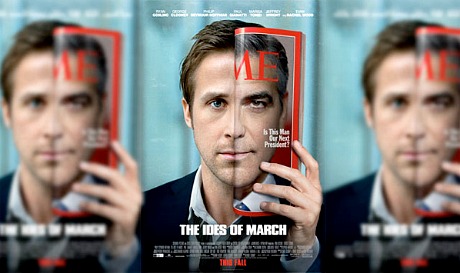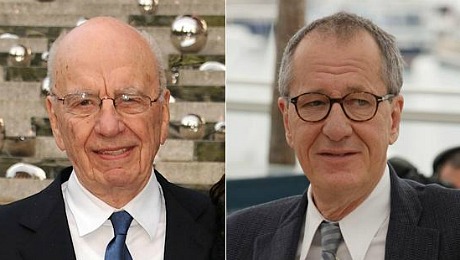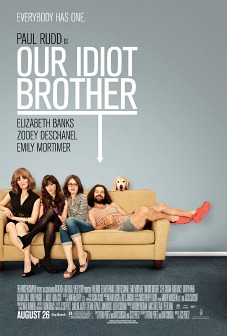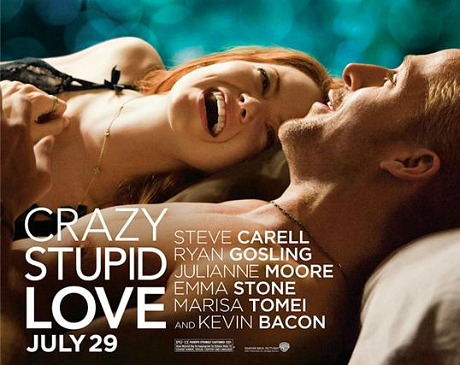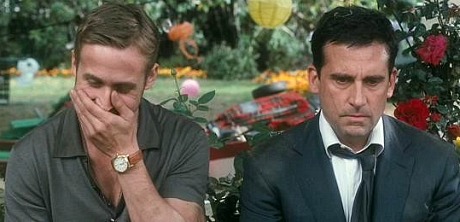I got more enjoyment out of David Letterman‘s Elizabeth Taylor jokes during Harrison Ford‘s 7.21 visit than I did from any one moment in Cowboys & Aliens (Universal, 7.29). I’m just being honest. Letterman told the joke twice and it worked both times. Jon Favreau and DreamWorks and Imagine and a platoon of screenwriters and the Universal guys invested a couple of years and $100 million to make this thing, and what did they make? Basically a big, noisy, ComicCon alien-invasion film with an agreeable sprinkling of old-west characters and atmosphere.
Yes, a lot of writers were thrown at Steve Oedeker‘s original screenplay — Roberto Orci, Alex Kurtzman, Damon Lindelof, Thomas Dean Donnelly, Joshua Oppenheimer, Mark Fergus, Hawk Ostby — and yes, some mildly interesting Old West elements with decent flavoring came out of this process. But the writing overall is still on the crude and primitive side and just okay, and the fundamental delivery is mainly about thump-wham-whoosh-rumble-boom. Orci was quoted a while back as saying the film is “Unforgiven with an alien invasion.” The man is kidding himself.
I’m glad an effort was made to westernize and humanize the film as much as possible in order to keep it from being Wild Wild West. It would been unbearable without this, but it’s still a movie for 13 year olds. It’s blunt, schematic and bludgeoning. And it resorts to familiar moves every step of the way. The punches, shootings and explosions are relentless, and the punches all sound like trucks slamming into a mountain of wrestling mats at 70 mph. And the movie is way, way over-produced.
SPOILER: There’s a bizarre shot at the end of the grand, overbaked finale that was obviously inspired by a certain real-lfe event that happened 25 years ago. Favreau and his team can’t deny this.
There’s a fascist tyranny to ComicCon movies that dictates that the same visual and aural elements and same bullshit cliches be used time and again to the point of punishment. It’s the same light-brown crap over and over and over, and it’s hell to sit through. (Tell me I’m wrong, Drew McWeeny.) This is why ComicCon movies are truly evil and poisonous, and why Favreau and other geek-friendly directors need to severely dealt with. I’m serious. These movies are cancer.
There’s a scene in which a creepy alien sound is coming from outside in the dark, and a lovable dog goes to see what’s up and three seconds after he disappears from sight he YELPS and CRIES. But later on he’s fine. Favreau gets ten demerits for the yelping and 25 if not 30 demerits for letting the dog live. I realize that you’re not supposed to kill dogs in movies, but…God, I hate what Favreau has turned into. All through Cowboys & Aliens you’re begging him not to follow the handbook. You’re moaning “please, please don’t do what I think you’re going to do”…and then he does it anyway. And then he attends a premiere and tells a red-carpet CNN interviewer that “this is why I really love directing.”
Is it possible to watch a ComicCon movie in which a character is not blown backwards from a super-hard punch or some kind of explosive impact? Or is it written into every contract for every ComicCon movie that this kind of thing has to be seen at least once?
And I’m getting really sick of the numbingly repetitious design of aliens in these films. The Cowboys & Aliens aliens are a blend of Ridley Scott and H.R. Giger‘s Alien monster and the big gurgly green guy in Super 8. They have slimy gloopy muck dripping out of their mouths and a gloopy slimy three-fingered hand appendage that pushes out from inside a mucky chest cavity, and that’s very boring.
The Cowboys & Aliens model & effects guys were apparently interested in creating a new kind of monster…but not really. They were obviously terrified of being too original so they borrowed from all the other life forms they’ve seen in other alien movies. How can they live with themselves? Do they honestly expect people like me to go, “Wow, cool”? You know what would be cool at this stage? Hiring seven-foot-tall guys in Martian suits with zippers up the back of their outfits to run around with ray guns and go “aaaah!”
All alien movies are designed by the same community of Hollywood craftsmen, and they all make monsters with the same digital gurgly sound. They all know each other and put their kids in the same schools, and they all copy each other. It’s the same syndrome you get with hillbillies marrying their siblings and cousins and their kids turning out deformed.


